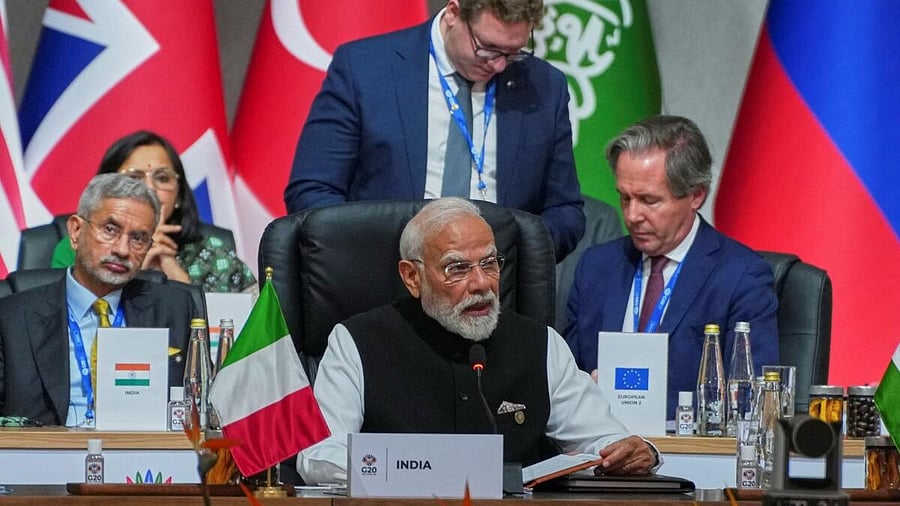
Prime Minister Narendra Modi addresses the plenary session of the G20 leaders' summit in Johannesburg, South Africa, November 22, 2025.
Credit: Reuters Photo
New Delhi: India, Canada, and Australia on Saturday launched a new trilateral technology and innovation partnership, as Prime Minister Narendra Modi met his counterparts, Mark Carney and Anthony Albanese in Johannesburg, where he urged the G20 to start an Open Satellite Data Partnership and a Critical Minerals Circularity Initiative.
He also proposed a G20 initiative to counter the drug-terror nexus, as well as a global healthcare response team, apart from underlining that it was time to look at new parameters of development, one which would address the imbalance of growth and overexploitation of nature.
Modi met Carney and Albanese on the sidelines of the G20 summit, which President Cyril Ramaphosa of South Africa hosted in Johannesburg and which President Donald Trump of the United States boycotted. The leaders of the three nations announced the launch of the Australia-Canada-India Technology and Innovation (ACITI) Partnership to boost trilateral cooperation on critical and emerging technologies, complementing the existing bilateral initiatives.
“The initiative will deepen collaboration between democratic partners across three continents and three oceans in emerging technologies, support diversification of supply chains, clean energy and mass adoption of AI,” Modi posted on X after he met Australian and Canadian prime ministers. “We look forward to working together to guarantee a better future for the coming generations!”
The initiative will leverage the natural strengths of the three countries, with an emphasis on green energy innovation and building resilient supply chains, including those for critical minerals. It will deepen the respective ambition and strategic collaboration towards net zero and drive further diversification of supply chains towards a secure, sustainable, and resilient future, according to a joint statement issued by the three sides. “The trilateral partnership will also examine the development and mass adoption of artificial intelligence to improve the lives of citizens of the three nations”.
The officials of the three governments will convene in the first quarter of 2026 to advance the initiative.
The prime minister earlier addressed the G20 summit and presented six proposals – a Global Traditional Knowledge Repository, a G20-Africa Skills Multiplier Initiative, a Global Healthcare Response Team, a G20 initiative on Countering the Drug-Terror Nexus, a G20 Open Satellite Data Partnership and a G20 Critical Minerals Circularity Initiative.
He said that the Global Traditional Knowledge Repository under the G20 framework could be built on India’s own knowledge systems initiative, and the global platform would help transmit the collective wisdom of humanity to future generations.
Advancing Africa’s development and empowering its young talent is in the interest of the entire world, the prime minister said, noting that the proposed G20–Africa Skills Multiplier Initiative could operate under a ‘train-the-trainers’ model across various sectors with all G20 partners financing and supporting this effort. “Our collective goal will be to prepare one million certified trainers in Africa over the next decade. These trainers will, in turn, help equip millions of young people with skills. This initiative will have a powerful multiplier effect. It will strengthen local capacity and significantly contribute to Africa’s long-term development,” said Modi.
The prime minister noted that drug trafficking, particularly the rapid spread of highly lethal substances like fentanyl, had emerged as a serious challenge to public health, social stability, and global security and also served as a significant channel for financing terrorism. To effectively address this global threat, the proposed G20 Initiative on Countering the Drug–Terror Nexus would bring together various instruments related to finance, governance, and security to weaken the drug-terror economy effectively.
The G20 Global Healthcare Response Team would comprise trained medical experts from the G20 countries and be prepared for rapid deployment in the event of any global health crisis or natural disaster, he said, adding that the proposed G20 Open Satellite Data Partnership would make the satellite data of the space agencies of all member nations in the bloc available to developing countries for agriculture, fisheries, disaster management and other activities.
The G20 Critical Minerals Circularity Initiative would foster recycling, urban mining, second-life battery projects and innovation of various types, and help in strengthening supply chain security, and develop cleaner pathways of development, said the prime minister.
Modi had meetings with Ramaphosa on the sidelines of the summit, as well as with French President Emmanuel Macron, British Prime Minister Keir Starmer, Italian Prime Minister Giorgia Meloni and Brazilian President Luiz Inácio Lula da Silva.
